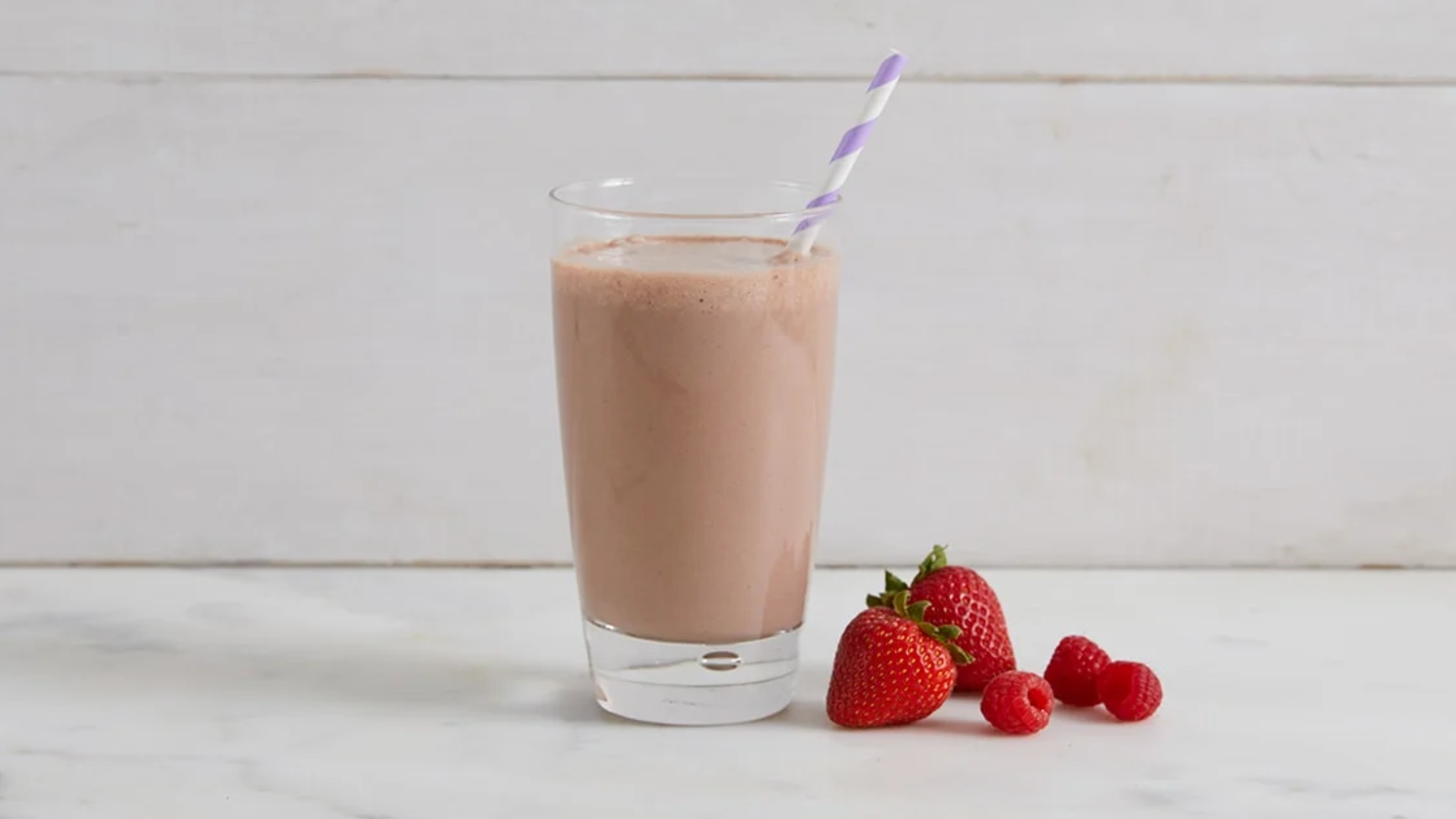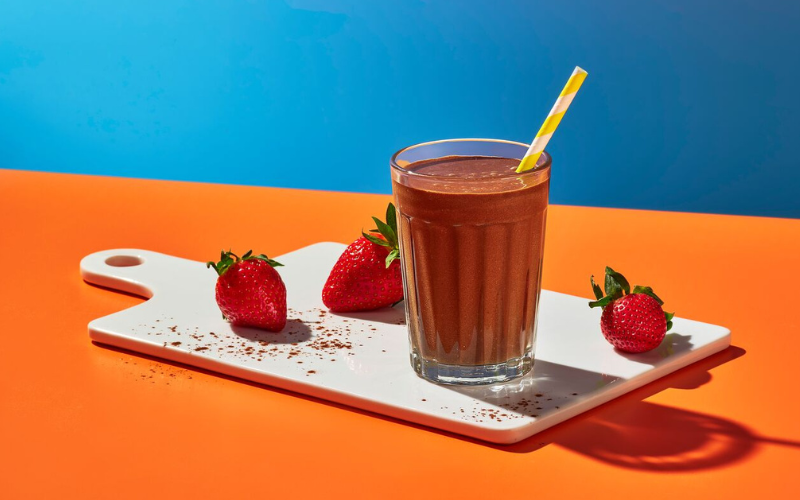The truth about meal replacement shakes for weight loss


Between grocery shopping, meal prepping, and navigating restaurant menus, it isn’t always easy to work toward a weight loss goal. Enter, meal replacement shakes, which take the guesswork out of making better choices. But do meal placement shakes work and do they actually help you lose weight?
While there’s some research around meal replacement beverages, healthy weight loss (i.e weight loss that happens gradually and can be sustained) generally requires behaviour changes you can practise long-term—meaning you’d have to seriously commit to meal replacement shakes for lasting results. What’s more, “meal replacement shakes don’t fix unhealthy eating habits,” says registered dietitian Jerlyn Jones. Here’s what else you need to know:
The science behind meal replacement shakes
Think of a meal replacement shake as a way to incorporate nutrition into your day whenever you lack the time (or patience) to plan a healthy meal and/or sit down and eat it, says Dr. Fatima Cody Stanford. Sold by the bottle or in a powder designed to be mixed with water or the milk of your choice, most meal replacement shakes provide a variety of important macronutrients—carbohydrates, protein, and fat—and vitamins and minerals. However, “all shakes aren't created equal,” Dr. Stanford says—and they can’t completely replicate a healthy diet full of whole foods containing antioxidants and the plant compounds known as phytochemicals, both of which protect your cells, Jones adds.
Meal replacement shakes for weight loss

Because they’re portion-controlled and convenient, meal replacement shakes may help you lose some weight, says registered dietitian Annette Frain. That said, they’re just one of many tools that can support your weight health journey.
Including a broad range of meal replacements—like soups, shakes, bars and portion-controlled meals—in your diet may help you lose weight and keep it off for approximately one year, according to a 2019 review of 23 studies on adults with overweight or obesity published in the journal Obesity Reviews. While this data may seem promising for fans of meal replacement shakes, this research comes with a few caveats:
- Meal replacement shakes weren’t the sole focus of the studies examined in this review. Meaning? It’s hard to say whether replacing meals with only shakes leads to long-term weight loss or what combination of meal replacement options is most effective.
- On average, each study subject only lost about 1.5kg. While losing any amount of weight—and keeping it off—can be beneficial for people with excess weight or obesity, such minor weight loss may not be worth the sacrifice of consistently skipping real meals.
- Subjects lost more weight when they combined meal replacements with other weight-loss strategies. Most of the time, successful weight loss results from practising a variety of behaviours. If the only change you make is sipping shakes in lieu of meals, you may lose less weight than those who replace meals and attend a support group, for instance.
At the end of the day, if you’re planning on drinking meal replacement shakes to consume fewer calories just until you drop a few kilos, your weight may rebound once you stop drinking them.
“Long-term weight loss requires learning to enjoy a variety of healthful foods from all of the food groups,” Jones says.
Potential health benefits of meal replacement shakes
"Shakes can be a better way to get nutrition than skipping the meal altogether,” says registered dietitian Adrien Paczosa. Here are some more perks of adding meal replacement shakes to your diet:
1/Protein
Most healthy adults need to consume about 0.8 grams of protein per kilogram of body weight per day to support the body’s natural processes. Government guidelines are around 0.75-1g/kg body weight per day, so that’s 49-65g of protein per day for a 65kg person. While most Australians get enough protein, if you happen to be missing the mark, supplementing your diet with a protein-rich meal replacement shake may help you reach your personal protein needs.
If you’re replacing a meal with a shake, Dr. Stanford recommends finding a brand that delivers about 20 grams of protein per serving.
2/Nutrients
“Many meal replacement shakes are a good source of vitamins and minerals such as calcium, potassium, iron, and vitamin D, which many people are lacking in their diets,” Jones says. Supplementing pre-made bottled shakes with your own ingredients—think spinach, which is full of vitamin C, and plain Greek yoghurt, which delivers extra calcium, potassium, protein, zinc, and vitamins B6 and B12—can make the shake even more nutritious.
Ideally, a meal replacement shake should provide a variety of micronutrients like B vitamins, calcium, magnesium, zinc, iron, and vitamins A, D, E, and K, which are essential to disease prevention and wellbeing, Jones says.
3/Convenience
Be it a quick, easy breakfast or lunch on the run, a bottled meal replacement shakes can be convenient and easy to transport. During a super busy day (or week, or month…) a quick shake can help keep you satisfied, Frain says.
Potential problems with meal replacement shakes
While certain meal replacement shakes can enhance an already nutritious diet, reaching for the wrong powder or bottle can detract from your efforts. Here’s why:
1/They may contain unnecessary added sugars
If your meal replacement shake tastes more like a milkshake than a meal, you might want to check the label for hidden sugars Jones says. To make sure you’re staying within the healthy daily limit for added sugars aim for a shake that contains less than 10 grams of sugar per serving, Dr. Stanford recommends.
2/They fall short on nutrients
When you drink a meal instead of eating it, it’s important that your shake contains the macronutrients—carbohydrate, protein, and fat—of a well-rounded meal, Paczosa says. Fibre, which is a carbohydrate, is also important if you want to feel fuller, she continues, but many meal replacement shakes are lacking in this department. Dr. Stanford recommends looking for a shake that contains around five or more grams of fibre per serving.
They can contain hidden servings
While you’re checking the ingredients label of your shake, it’s important to note the serving size, too, Dr. Stanford says. Oftentimes, there’s more than one serving per bottle. Drink the whole thing, and you could be ingesting more sugar and calories than you bargained for.
Meal replacement shakes for men vs. women
Generally, men tend to have more muscle mass than women and therefore, may have higher daily protein needs, Chapmon says—one reason why some meal replacement shakes may appear to be marketed toward a specific sex.
That said, at the end of the day, the quality (and macronutrient quantities) of your diet comes down to the sum of its parts. If you’re concerned about not getting enough macronutrients or vitamins and minerals for your lifestyle, or feel overwhelmed when it comes to choosing a quality product, guidance from a registered dietitian can be helpful, Frain says.
Otherwise, eating a variety of colourful vegetables, legumes, fruits, wholegrains, low-fat dairy, and lean proteins should provide the proper amount of vitamins, minerals, and macronutrients for most people.
How to use meal replacement shakes
If you want to incorporate meal replacement shakes into your weight loss journey, two small studies published in 2012 and 2018 suggest that replacing one to two meals a day with meal replacement beverages may increase weight loss, Jones says—but it’s important to note that each of these studies were conducted on less than 200 people and only went on for 12 weeks. So while there may be short-term benefits, the long-term advantages remain to be seen.
If you’re thinking of supplementing your diet with shakes (i.e drinking them as snacks between meals rather than instead of breakfast, lunch, or dinner), Jones recommends sticking to half a serving. Drinking a full shake between meals may ultimately lead you to consume more calories than your body needs, which could contribute to weight gain.
Are meal replacement shakes “healthy”?
What makes a meal replacement shake healthy (or unhealthy) is the quality of its macro and micronutrients and how it fits into the context of the rest of your diet.
Ultimately, it may be smarter to focus on eating whole foods so you can make healthy choices in the absence of meal replacement shakes, according to Paczosa. After all, eating should be about both health and enjoyment.
